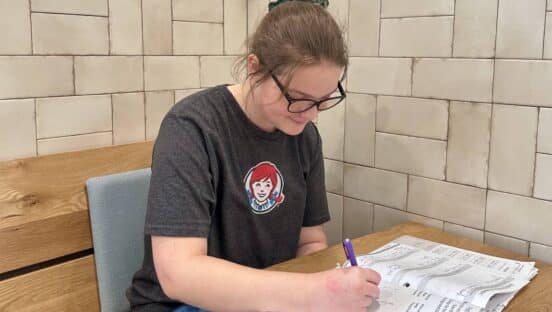Hamra Enterprises is rewriting the rulebook for student workers with an onsite homework program. The Wendy’s, Panera Bread, and Noodles & Company franchisee pays employees to sit in the dining room and work on homework for an hour before or after their shift.
The Springfield, Missouri-based company also rewards team members for good grades, offering $300 for report cards with straight A’s, $200 for A’s and B’s, and $100 for all B’s.
“A lot of people that work for us who are in high school or college aren’t just there to have a job,” says CEO Mike Hamra. “There’s a financial need for them to support either themselves or their family, so we wanted to help ensure they can be successful in getting an education while they’re working to make ends meet.”
The onsite homework program began in 2022 at a Panera location in Needham, Massachusetts, that was struggling with staffing. The company set out to find a way to provide an extra level of support for employees while also improving turnover and retention.
“We put together some ideas, and then we really worked with the management team there to craft the program,” Hamra says. “We tweaked a few things here and there as we were doing the pilot. That came from listening to the associates about what they liked, what they didn’t like, what was working for them, and what wasn’t working for them.”
As an example, the idea to carve out homework time either before a shift starts or after a shift ends came directly from team members.
“We wanted to make it as available and flexible as possible for the people that are participating in it, and we wanted to create more of an opportunity for them to really step into the program easily,” Hamra says.
After fine-tuning the parameters based on feedback from student employees, the company brought the pilot to more restaurants, mostly Wendy’s and Noodles locations in its home state. When all was said and done, around 60 employees at 22 stores participated in the test run.
Hamra Enterprises started rolling out the program across its entire footprint last spring. Paid homework time and cash rewards for good grades are now available to all eligible employees at nearly 200 stores across 11 states.
“As with any new program, it’s great if you can come up with a brilliant idea, but it makes no difference unless you build awareness around it,” Hamra says. “That’s always the biggest challenge. You have to empower your leaders, your managers, and your other team members to talk about it.”
Word-of-mouth is the most effective way to drum up support and encourage buy-in throughout the organization, he adds. That comes from sharing information through as many employee touch points as possible, from in-store posters and the company’s website to its internal newsletter.
“Of course, with younger adults, the key is reaching them through communications on their desired platforms, so we’ve also launched a social media campaign to help get the word out,” Hamra says.
As far as the financial tradeoff that comes with paying employees to sit in the dining room and do homework, he sees it as less of a cost and more of an investment.
“There are lots of anecdotal stories of businesses buying into the next fancy new trend or direct financial resources in the hopes of getting some competitive edge,” Hamra says. “As we see it, by attracting the best employees and retaining them, any investment in the homework program is more than offset by a reduction in training costs.”
He points to the Panera in Needham, where the program helped bring about a significant improvement in the staffing situation. Turnover was around 80 percent in October 2022 before the pilot got off the ground. A year later, it was down to 58 percent. Retention at the restaurant improved from 51 percent to 65 percent during the same time period.
“There are other things that we’ve done around leadership training and supporting employees, but the homework program definitely contributed to that,” Hamra says. “If you look at it on an annual basis, turnover dropped by 22 percent and retention went up by 14 percent after the implementation of that program at that particular store.”
The good grades incentive, meanwhile, is proving particularly useful for employees who need help covering education expenses like tuition, school supplies, and activity fees.
“One of my favorite things to do when I’m in the stores and meet somebody who’s in high school or who’s in college is talk about these programs,” Hamra says. “They say things like, ‘I came here to work to support myself, or I came here to work because my family needed the extra money. I don’t have anybody else to give me a financial incentive to go get A’s and B’s, so I feel better about putting my time and attention toward my education because I know I’ll get something out of that.’”
Helping student employees succeed in the classroom is just one way Hamra Enterprises aims to support its workforce. There’s a program called Hamra Employes Reach Out that is partially funded by employees, with the company matching every contribution dollar-for-dollar. Those funds provide financial assistance for things like extended medical leave, funeral expenses, and transitional housing. The company also has programs that aid in financing home ownership and covering daycare costs. “Competition for the brightest and best employees is pretty fierce out there right now, so it makes a difference for people when their employer is supporting them not just with a paycheck, but in other areas of their life that are important to them,” Hamra says. “We typically find that when our support structures are in play, and people are utilizing them and engaging with them, those employees are happier and stay with us longer. They also spread the word about us as an employer to their friends and family, and that makes a big difference in attracting and retaining people.”









